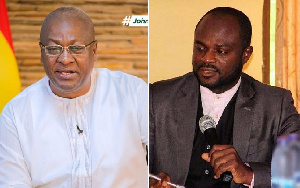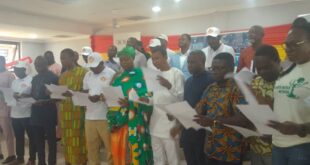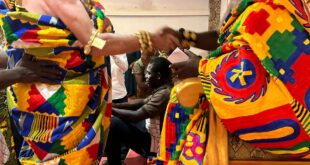Justice Abdulai, the private legal practitioner and law lecturer who petitioned the Supreme Court over the voting rights of the Deputy Speakers of Parliament has apologized to former President John Dramani Mahama.
Abdulai’s apology is linked to what he said was a purported twist on comments he made about Mahama’s public advice to him to seek a review of the March 9 apex court ruling.
Speaking on the Saturday, March 19, 2022 edition of Joy FM’s news analysis programme, News File, Justice Abdulai said he did not at any point intend to disrespect Mahama.
“I’ll never disrespect former President Mahama so I’ll never use any derogatory words against him, not under any circumstance,” he said.
“There have been rumours that I had snubbed President Mahama and I had even insulted and disrespected him. Some of these made it to the front pages of newspapers but these claims are untrue,” he said.
“I wouldn’t want to justify it by explaining it so I’ll rather render an unqualified apology to him. He’s a person I respect so much,” before adding that his views about Mahama’s advice remain intact.
“I’m not apologizing for my comments but I’m apologizing for the mischief that has been created out of it,” he emphasized.
What Justice Abdulai said:
Reacting to the call by Mahama for him to seek a review of the 7 – 0 ruling by the Justice Dotse-led bench, he said in an interview on an Accra-based radio station, “the former president cannot advise me on the law because he is not a lawyer.”
What Mahama said about the ruling:
Mahama, in his third social media reaction to the ruling on March 13 stated in a write up: “What is the determination of the SC? That Deputy speakers can shout aye or nay with the side they agree or disagree with in the voice vote?
“The SC is leading us into the realm of absurdity! This judgement is regrettable, and I look forward to the applicant applying for a review of this ruling.”
Background
Following controversy over the rejection (by Minority) and later approval (by Majority) of the 2022 budget by one-sided Caucuses of the 8th Parliament, a private legal practitioner, Justice Abdulai, filed a case against at the Attorney General at the Supreme Court.
He prayed the Court to interpret two Articles – 102 and 104 – of the 1992 Constitution and by so doing to declare the proceedings in Parliament on November 30, 2021, which led to the passage of the 2022 Budget and Economic Policy as unconstitutional.
He specifically cited the fact that the Presiding Speaker, First Deputy Speaker, Joseph Osei-Owusu, had counted his vote despite acting as Speaker.
However, in defence of the State, the Attorney-General, Godfred Yeboah Dame, argued that there was no express provision in the 1992 Constitution that stops a Deputy Speaker presiding over proceedings from voting or counting himself as part of MPs present to form the right quorum.
The Justice Jones Dotse-led bench ruled against the request and upheld that Deputy Speakers could vote and could be counted to form quorum.
By so doing, they expunged portions of Parliament’s Standing Orders and directed that the House moves to amend and or enact the necessary Constitutionally compliant rules to guide their processes.
 Home Of Ghana News Ghana News, Entertainment And More
Home Of Ghana News Ghana News, Entertainment And More





